- Home
- Dana Cameron
Site Unseen Page 14
Site Unseen Read online
Page 14
Funny how little distance it took, physically or mentally, to move beyond the narrow scope of one’s little world. We are the centers of our own remarkably private constellations, and it was surprising to find, as one did occasionally, how fragile these consensual arrangements really are.
I looked at the photograph again and smiled briefly, then frowned: It wasn’t the thought of Brian that was keeping me here, and not my overdeveloped conscience either. There was something else, something big that I was missing, like a bear hiding behind the drapes.
Suddenly I was thinking of Oscar. And Shakespeare.
Of all the memories I cherished of my grandfather, the one that I took out least often was the one of me sitting in his lap while he read from his ancient Riverside. I was afraid that if I recalled those peaceful summer evenings too frequently, I would wear out the recollection, and it would be lost to me forever. He always said that the point of reading those plays was to teach me about context and interpretation and structure, but I knew better than to believe that, even as a kid. What I couldn’t learn from all our hikes or the visits to his sites; what I couldn’t learn about interpretation from the Oscar Fielding was not going to be found in some moth-eaten, dog-eared volume of antiquated, elitist plays.
It was simpler than that. He loved the sound of the words. He read to me for the pleasure of hearing his own voice and for the pleasure of sharing it with me. The purple prose passages suited him down to the ground, appropriately huge text for someone who had always been larger than life. That deep-timbred roar, the one that was the fear and scourge of his students and colleagues, could be harnessed and fed into a Petruchio of outstanding rudeness, the most villainous Iago ever heard, or such a witty Mercutio that if Juliet had been really smart, she would have dumped that other numbnuts and run off with him instead. And Grandpa’s Falstaff was the best.
I shook my head. Why was this coming to me now? It tortured me that Oscar wasn’t here. He was the only one who would have known the precise region of hell in which I was presently lodged. But why this particular memory?
Shakespeare? I thought about that for a minute. I had, of course, been dredging up lines associated with every outrage, every blasphemy, every—go ahead, I thought, say it—every murder, since that terrible moment on the site. The images evoked by “the soul’s frail dwelling-house” and “cold and empty veins, where no blood dwells” haunted me—the words popping into my head unbidden at inopportune intervals. But that was only natural, these were the only words big enough to express my feelings. My own feeble attempts couldn’t begin to accommodate them.
And what else? What are you leaving out that you shouldn’t be? What’s behind the words? Think about it logically. A little voice in the back of my head became more insistent, pushed and prodded for attention.
Grief, of course. Huge loss. Guilt, I suppose, but…my God, I’m so angry, I just don’t know what to do.
More, the voice urged, even more than that. What’s stronger than that? What is the common thread running through all those lines that keep coming to you?
Duty? Oh come on, revenge? Tichnor’s dead, for chrissake…
Does that mean he gets away with it? And if the sheriff isn’t convinced, perhaps neither should you be. And you’re the one in the middle here. You’re the one who knows things, who holds the key to all of this.
I thought about that as another fusillade of rain beat a tattoo on the roof of the truck. I slowly picked up the keys, then decisively turned her over. I was freezing. As I waited for the ineffectual heater to warm up the cavernous vehicle, I began collecting up the miscellany that defines me in this culture and jammed it all back into the tired wallet without regard for the tidy little plastic folders that are there for other folks to use.
I suppose, having made a decision, I should have been relieved, but I was nothing but mad: Why me? I flicked on the wipers again and backed out of the parking space. But it certainly had been a surprise, me actually going so far as to entertain the idea of letting myself off the hook. I don’t know why, it must have been exhaustion that was making me dither. Deep down, I knew that I had to find out the truth; the alternative was unthinkable. I certainly hadn’t needed to waste time and gas money to bully myself into the decision to look into Pauline’s death for myself.
And being a scientist, I only believe in ghosts for other people.
“So when is the funeral?” Brian asked later that evening. I’d finally been around when he returned my call.
“I don’t know. There’s got to be an…investigation.” I couldn’t say the word autopsy. “When can you get here?”
There was a long pause on the other end. “I’m going to do my damnedest to get there as soon as I can, but I honestly don’t know. We’re right in the middle of things, but I’m trying for a day or two.”
“Can’t Kam cover for you?” I was ashamed to admit to myself that I hoped the desperation in my voice would influence him.
“Not at the moment. His schedule’s all over the place. He’s still in Chicago for a couple days and won’t be out here until next week.”
“Shit.”
“It’s not hopeless, and I swear I’m doing everything I can to get away. Has the sheriff come up with anything else yet?”
“Just a lot of questions. I’ve got an appointment to go down to the station tomorrow to answer some more questions about times and things; I’m also going to try to get some more details from them. What I know so far is that the fire was arson; whether Pauline’s death was intentional is still up in the air. Tichnor’s dead, but that could be an accident, they don’t know yet; it looks like food poisoning. They don’t even know if the two are connected, but I do. I’m sure of it. There are too many coincidences.” I bounced my fist gently against the wall in frustration. “But every time something else pops up, it only seems to confuse the matter.”
“I know, Emma. I know.” Brian paused, and I knew he was trying to find the right words. I tried not to be impatient with him even though I knew whatever he was thinking was probably for my own good. “But look, do me a favor?” he began. “I know your instinct is to try to wrap up all the loose ends at once, but I really want you to try and just deal with what you know for sure right now. You’ve got plenty to cope with, without adding more to your plate. Just get through packing up the dig and dealing with the fact that Pauline’s gone. The other stuff will still be there once you’ve had a chance to…get that sorted out.”
I hated that he was right; it went against every inclination I had. “I’m just going to tell them again everything I knew of Pauline’s plans and when I last saw her and stuff. I don’t know any more.”
“All right.” He didn’t sound convinced.
“What is it?”
Again there was that sense that Brian was choosing his words carefully. “Emma, I hate to ask this, but has anyone said anything to you about your being a suspect? That you might have—”
I was stunned. “Brian, how could you say such a thing? Why…how could you even think…?”
“It’s not what I think,” he said quickly, “God, no, never. But I’m just worried that your relationship with her might prejudice them against you and I want you to make sure that you get a lawyer if anything like that comes up today. Give Mark Regan a call; if he can’t help you, he’ll know who can.”
I couldn’t say anything for a moment and the silence stayed between us like an icy chasm. “That’s just so cold-blooded that I can’t even think straight.”
“That’s why I bring it up,” he said. “This looks like it might be murder and I just want you to be careful, that’s all. I know you can’t imagine that anyone might think you did it, but that doesn’t mean they can’t come up with some stupid reason. Do you see what I mean?”
“Yes, and it sucks.”
“I know. I love you, that’s why I told you. I want you to look out for yourself, until I can get there.”
“So, what, you’re going to take care of me then
?” Brian didn’t deserve bitchiness, but I couldn’t help it.
“Yes.”
He said it so plainly that I couldn’t make any argument. That way was easy and it let me be angry, which was so much easier than grieving. But I knew what he meant anyway, and it was no indictment of my capabilities. I decided to be as adult as Brian.
“Okay. You get yourself up here as quick as you can. Yesterday.”
“I promise. I love you so much.”
“I love you too. Come home. I need you.”
I got more of the answers I wanted Wednesday morning, but not nearly enough to satisfy me. And worse yet, it seemed, not quite enough to satisfy anyone else.
“Do you recognize any of these things, Professor Fielding?” Sheriff Dave Stannard laid out a small collection of objects on his blotter for me, a moment after I was seated at his desk.
“Well, it depends on what you mean,” I said. “I can probably tell you what most of them are.”
I was becoming very familiar with the inside of Stannard’s office. I was also becoming accustomed to the sheriff and his questions, but I just went along with them, letting the misery of the past couple of days be compartmentalized into an orderly set of details, trying to figure out just what angles he was working from. “I think you want to know something else.”
“You are right about that, but humor me for a minute,” he said. “I want to make sure that I’ve got them listed properly for the evidence inventory. Then I’ll ask you what I really want to know.”
Oh, real subtle, I thought sourly. I looked at the objects and then at the sheriff, puzzled. The little bags held artifacts, nice ones, as far as I could tell. They were collecting quality and not what I was used to finding in the ground. He nodded for me to go ahead.
“Well, that’s a porcelain tea bowl. Is it okay to touch?” I was surprised and a little disappointed that the evidence bags looked like nothing so much as the artifact bags we used. I had hoped for something a little more glamorous, I suppose, more high tech or esoteric.
Stannard nodded, and I picked up the plastic evidence bag with a thin porcelain cup and had a close look at it. “It’s Chinese and I’m not real good with the exact dates without my books, but based on that interior rim decoration, I guess it’s early eighteenth century. It’s pretty. It also looks expensive, I mean, it’s not chipped or cracked and the gold leaf is in good shape. Good enough to be in a museum.”
I put it back, and after he nodded again, I picked up the next bagged object, long and thin with some moving parts. A glint of bright metal caught my eye. “This is valuable,” I said right away. “A silver and red coral baby pacifier. The smooth coral bit was to suck on, to relieve teething pain, maybe, and they had little silver bells and a whistle to amuse an older child. It’s probably English or European, and again, it might be eighteenth or nineteenth century.”
Then it hit me that I actually recognized this piece. “This is Pauline’s!” I quickly looked at the rest of the objects. “These all belonged to Pauline! That’s what you wanted to know, wasn’t it?” I studied his face; it was grim.
“We were pretty sure of that when we found them but we needed an identification.” The sheriff avoided my searching glance. “Just keep going through the things, though, make sure they are all hers.”
What’s going on here? I wondered. Then it struck me. “Wait. These things weren’t in the house! They’re not burned!”
Stannard nodded again. “What about the other objects?”
“I wouldn’t recognize all of her stuff, you know,” I said. “Pauline collected thousands of things, objects from all different periods and everywhere on earth. I can only give you my best guess on some of them.”
“That’s all I’m asking.”
I went through the remaining objects quickly. A pair of gold-bound tiger claw earrings from India, a small jade statuette of a fish, a small Egyptian scarab pendant, an ornate Venetian dagger. Before the memories of these objects and the sorrow of remembering the stories that Pauline had told me about them could overwhelm me, I picked up the last object. And gasped.
It was a brownish clay figurine. It was roughly the shape of a woman, with pendulous breasts and a huge belly. It had no arms, and only a suggestion of legs made by an incised line extending from beneath the belly down a narrowing cone of clay. The face was a blank surface and the hair was represented by a collection of whorls and what looked like dreadlocks. Depending on your point of view, it was either dull and rude, or beautiful in a very elemental way.
I had never seen this before—where the hell did Pauline get it? My God, what if it’s real! “Can I take it out of the bag?” I asked eagerly.
The sheriff nodded. “You look surprised by that,” he said noncommittally. “I’ve got no clue what it is or what it’s doing with that other stuff. It’s kinda ugly. You care to fill me in?”
“I’m not even sure if it’s genuine, but if it is, it’s pretty near priceless. At least in terms of research,” I said breathlessly. I set it down reverentially, then had to pick it up again, just to touch the precious thing. “I don’t even know how you’d go about setting a price on this.”
“What is it?”
“What I think it is, is a late Paleolithic figurine, sometimes called a “Venus” figurine. Some people consider these to represent the first organized form of religion.” I was lost in marveling over the small object.
“Late Paleolithic?”
“Um, Old Stone Age. This is probably at least twenty-five thousand years old, probably European. Possibly North African.” Though it could be from Western Asia, too, I thought—I really didn’t know much about this sort of artifact. I had no idea that Pauline was interested in such things; it had to be from an old private collection, for I knew she was too scrupulous to have touched anything that was to be found on the illicit antiquities market.
Stannard still looked confused. He ran a hand through his hair, leaving it messy, something I could see was a habit with him when he was in thought or confused. I could see he had no frame of reference for that scale of time.
“If you think of the Egyptians as having built the pyramids five thousand years ago,” I explained, “then this shows up twenty thousand years before that. The first anatomically modern humans only appeared about fifty thousand years ago. That gives you some idea of its importance.”
The sheriff let out a long whistle. “Pretty darned old. I would have thought a kid made it. It’s not real impressive-looking.”
“Well, you’re right about that,” I said, turning it over and thinking that I should really be wearing gloves to handle it. It seemed stable enough, though, and clay wasn’t nearly as susceptible to body oils as glass or metal or paper. “It’s got all these exaggerated features, and it’s small and looks dirty, but on the other hand, it’s got a lot of subtle style to it. Look at the detail in the hair. The proportions of the body are well balanced, even with the huge breasts and belly. It’s very well executed, and it’s been fired too. A lot of thought went into the making of this.”
“I can see that, now that you’re showing me. You look at your evidence the same way we look at ours,” he said. “But how many people would recognize a thing like that?”
“Oh, any number, I suppose,” I said distractedly; I wished Stannard would be quiet for a minute. I couldn’t imagine the next time I’d be allowed to examine such a wonderful thing. “Anyone who’s taken an art history course, or a course in prehistory or maybe anthropology. Possibly some collectors, but it’s a pretty rare sort of item. They do come up on auction blocks, but that’s not something I really follow.”
I failed to attribute any significance to the silence coming from the other side of the desk.
“That’s a real small percentage of the population, you know,” Stannard said finally.
“Not in the circles I travel in,” I said, grinning slightly. The sensation was odd: Eventually I would have to get used to smiling again.
Suddenly I g
ot the point the sheriff was making, and my grin vanished as quickly as it came. I put the figurine down, very carefully. “Where did you find this? Why is it in with all these other things? Why aren’t they burned?”
Stannard got up and began to pace. “I was kind of hoping you could tell me something about that. We found all of these other things stashed under the bed in Grahame Tichnor’s house.”
“I knew it! I told you, of course he did it!” But vindication meant nothing now; I clenched my teeth to resist imagining how Pauline died.
He nodded and continued his measured progress back and forth across the floor. “It certainly suggests to some of us that he was the one who killed Pauline Westlake. But—”
“But what?”
“Most of these things here make sense, if you are a regular crook without too much imagination or smarts.” He walked over to the desk to look at the objects again. “Valuable-looking stuff, with gold or silver or precious stones on them. That clay figurine is a different thing altogether. Not too many people around here would recognize its value. Even that teacup is a stretch—who’d know that an old blue and white cup was valuable?”
“Tichnor might have,” I pointed out. “He was a pothunter.”
Stannard frowned. “Those aren’t pots, are they? Leastwise, not the sort of thing that crops up around here. What if he was the one who’s been digging up the park at Fort Archer? I mean, there are all those rumors about pirate treasure or buried gold around here, right? I always figured that’s what whoever was doing it was after. But none of this stuff is the sort of thing you’d find there, is it?”
“No, of course not. But you said all this was found in his house, right?”
“Yes. That’s not to say that he put it there.”
“Why wouldn’t he have put it there, then, if you found it in his house?” I was thoroughly confused now.
“Someone who wanted it to look like Tichnor had killed Pauline Westlake and set the fire. It’s pretty convenient he’s dead all of a sudden, wouldn’t you say?” The sheriff sat on the corner of his desk and crossed his arms over his chest. “You seem to be pretty eager to blame him yourself.”

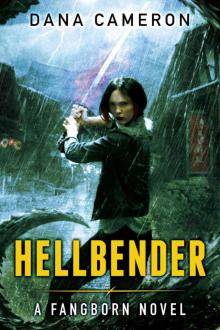 Hellbender (Fangborn Book 3)
Hellbender (Fangborn Book 3)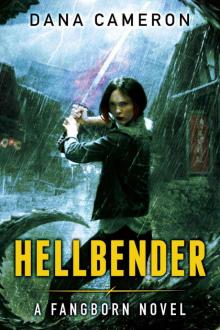 Hellbender (The Fangborn Series Book 3)
Hellbender (The Fangborn Series Book 3) Hellbender
Hellbender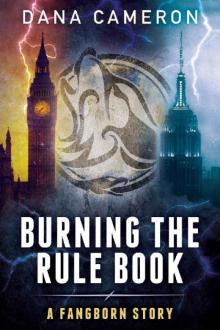 Burning the Rule Book
Burning the Rule Book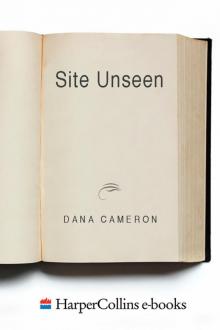 Site Unseen
Site Unseen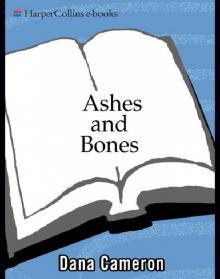 Ashes and Bones
Ashes and Bones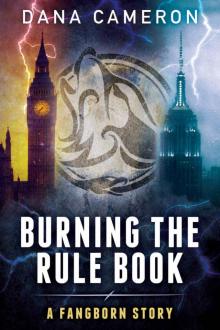 Burning the Rule Book (A Fangborn Story 3)
Burning the Rule Book (A Fangborn Story 3)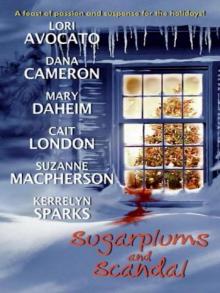 Sugarplums and Scandal
Sugarplums and Scandal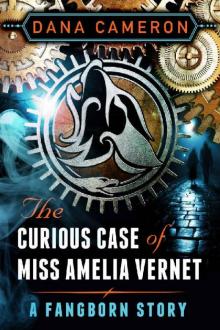 The Curious Case of Miss Amelia Vernet
The Curious Case of Miss Amelia Vernet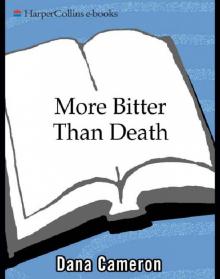 More Bitter Than Death
More Bitter Than Death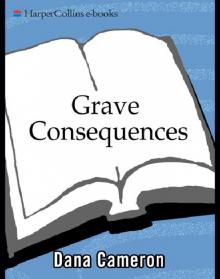 Grave Consequences
Grave Consequences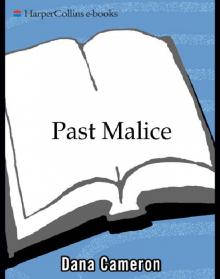 Past Malice
Past Malice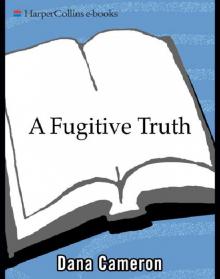 A Fugitive Truth
A Fugitive Truth Seven Kinds of Hell
Seven Kinds of Hell